Daily Vocabulary Words: List of Daily Used Words in Leading International Newspapers
Hi there. Welcome to this special section @ Wordpandit.
Our endeavour here is very simple: to highlight important daily vocabulary words, which you would come across in leading newspapers in the country. We have included the following newspapers in our selection:
• The New York Times
• The Washington Post
• Scientific American
• BBC
• The Guardian
• Psychology Today
• Wall Street Journal
• The Economist
We are putting in extensive work for developing your vocabulary. All you have got to do is be regular with this section and check out this post on a daily basis. This is your repository of words that are commonly used and essentially, we are posting a list of daily used words. Hence, this has significant practical application as it teaches you words that are used commonly in leading publications mentioned above.
Visit the website daily to learn words from leading international newspapers.

WORD-1: SHIMMERING
CONTEXT: Think of them as elusive, shimmering creatures from another planet.
SOURCE: The New York Times
EXPLANATORY PARAGRAPH: Imagine when the sun shines on a pond, and the water looks like it’s dancing with tiny sparkles. That’s shimmering! It’s when something shines and seems to move a little, just like those sparkles on the water.
MEANING: Giving off a sparkling or shining light, often with a slightly wavering quality. (adjective)
PRONUNCIATION: shim-er-ing
SYNONYMS: twinkling, glittering, gleaming, sparkling, glistening, shining, scintillating
USAGE EXAMPLES:
1. The dress was shimmering in the spotlight.
2. The sea looked beautiful, shimmering under the moonlight.
3. Her necklace was shimmering with many colorful jewels.
4. The shimmering surface of the lake reflected the mountains.

WORD-2: INEBRIATED
CONTEXT: With that euphoric smile that could light up an arena, he pulled out his driver’s license for her.
SOURCE: The New York Times
EXPLANATORY PARAGRAPH: Imagine seeing someone who has had too much juice, and now they’re acting silly and can’t walk straight. That’s because they’re inebriated! It’s a big word that means someone drank too much and can’t think or act right.
MEANING: Being drunk or intoxicated. (adjective)
PRONUNCIATION: in-ee-bree-ay-ted
SYNONYMS: drunk, intoxicated, tipsy, hammered, plastered, sloshed, buzzed
USAGE EXAMPLES:
1. He was so inebriated he couldn’t find his house keys.
2. It’s dangerous to drive when inebriated.
3. After the party, several people were inebriated and needed rides home.
4. She was inebriated after just one glass of wine.

WORD-3: EUPHORIC
CONTEXT: With that euphoric smile that could light up an arena, he pulled out his driver’s license for her.
SOURCE: The New York Times
EXPLANATORY PARAGRAPH: Think about the happiest you’ve ever felt, like maybe after getting the biggest ice cream cone ever! That super happy feeling is called “euphoric.” It means you’re so happy that you feel like you’re floating.
MEANING: Extremely happy or excited. (adjective)
PRONUNCIATION: yoo-for-ik
SYNONYMS: elated, ecstatic, overjoyed, thrilled, exultant, jubilant, over the moon
USAGE EXAMPLES:
1. He felt euphoric after winning the game.
2. The news of the trip left her in a euphoric mood.
3. The music at the concert was so good, it made the audience feel euphoric.
4. The team was euphoric after their unexpected victory.

WORD-4: SUMMIT
CONTEXT: A couple days ago, African leaders echoed and amplified this dynamic, by adopting the “Nairobi Declaration” during the first Africa Climate Summit in Kenya.
SOURCE: Project Syndicate
EXPLANATORY PARAGRAPH: Imagine you’re climbing a big mountain, and you finally reach the very top. That top point is called the “summit.” It’s the highest part of a mountain or hill.
MEANING: The highest point or top of a hill or mountain. (noun)
PRONUNCIATION: sum-it
SYNONYMS: peak, pinnacle, top, crest, apex, tip
USAGE EXAMPLES:
1. We reached the summit of the mountain by noon.
2. The climbers were excited to stand on the summit and look down.
3. The summit of the hill provided a panoramic view of the city.
4. After days of hiking, they finally reached the mountain summit.

WORD-5: VULNERABLE
CONTEXT: The Paris summit demonstrated our goal: a world where poverty is eliminated, the health of our planet is preserved, and vulnerable countries are better equipped to face the crises that arise from climate change and conflicts.
SOURCE: Project Syndicate
EXPLANATORY PARAGRAPH: Imagine you have a toy that can easily break if you’re not careful. That toy is “vulnerable.” It means something or someone can get hurt or broken easily.
MEANING: Capable of being hurt or harmed, physically or emotionally. (adjective)
PRONUNCIATION: vul-nuh-ruh-bul
SYNONYMS: exposed, at risk, endangered, defenseless, weak, susceptible, frail
USAGE EXAMPLES:
1. The bird with a broken wing was vulnerable to predators.
2. After hearing the sad story, she felt emotionally vulnerable.
3. The city was vulnerable to floods because it was below sea level.
4. Without his armor, the knight felt vulnerable in battle.
WORD-6: REIGNED
CONTEXT: In May 2021, Chileans elected a constitutional convention where the far left reigned supreme and the right had fewer than the one-third of the seats required to block controversial provisions. That convention produced a text so radical that nearly two-thirds of voters rejected it in a referendum. Now Chileans have elected a new Constitutional Council, but this time they put a far-right party in the driver’s seat, with the left controlling fewer than one-third of the votes.
SOURCE: Project Syndicate
EXPLANATORY PARAGRAPH: Think about a king or queen who is in charge of a kingdom. When they are ruling and everyone listens to them, we say they “reigned.” It means they were the boss for a while.
MEANING: Ruled or was dominant in an area or period. (verb, past tense)
PRONUNCIATION: raynd
SYNONYMS: ruled, governed, dominated, presided over, controlled, led
USAGE EXAMPLES:
1. The queen reigned over the land for forty years.
2. During the 1990s, that style of music reigned supreme.
3. Under his guidance, peace and prosperity reigned in the town.
4. She reigned as the company’s CEO for a decade.
WORD-7: RADICAL
CONTEXT: In May 2021, Chileans elected a constitutional convention where the far left reigned supreme and the right had fewer than the one-third of the seats required to block controversial provisions. That convention produced a text so radical that nearly two-thirds of voters rejected it in a referendum. Now Chileans have elected a new Constitutional Council, but this time they put a far-right party in the driver’s seat, with the left controlling fewer than one-third of the votes.
SOURCE: Project Syndicate
EXPLANATORY PARAGRAPH: Imagine doing something in a very different or extreme way, like eating breakfast for dinner! “Radical” means something is very different from the usual or traditional way.
MEANING: Very different from the usual or traditional; extreme. (adjective)
PRONUNCIATION: rad-i-kul
SYNONYMS: revolutionary, extreme, drastic, far-reaching, profound, major
USAGE EXAMPLES:
1. He proposed a radical change to the company’s structure.
2. The new law was seen as a radical departure from the previous one.
3. The scientists made a radical breakthrough in their research.
4. The team needed a radical solution to their recurring problem.
WORD-8: REFERENDUM
CONTEXT: In May 2021, Chileans elected a constitutional convention where the far left reigned supreme and the right had fewer than the one-third of the seats required to block controversial provisions. That convention produced a text so radical that nearly two-thirds of voters rejected it in a referendum. Now Chileans have elected a new Constitutional Council, but this time they put a far-right party in the driver’s seat, with the left controlling fewer than one-third of the votes.
SOURCE: Project Syndicate
EXPLANATORY PARAGRAPH: Imagine if everyone in school got to vote on whether they wanted pizza or burgers for lunch. That vote is like a “referendum.” It’s when people get to vote on one specific thing to decide what to do.
MEANING: A general vote by the public on a single political question. (noun)
PRONUNCIATION: ref-uh-ren-dum
SYNONYMS: vote, ballot, poll, plebiscite, public vote
USAGE EXAMPLES:
1. The country held a referendum to decide on the new law.
2. Many people turned out to vote in the historic referendum.
3. The results of the referendum surprised many pundits.
4. The referendum on joining the union was highly controversial.
WORD-9: MORALIZING
CONTEXT: Mental health disorders and obesity fall into a bucket of diagnoses that, amid a lack of complete knowledge of their causes, are subject to societal moralizing and stigma. We make assumptions that people with depression aren’t trying hard enough, that people with obesity lack willpower. These stigmas are then compounded by a limited understanding of how their treatments work, leading to further judgments of people who seek them.
SOURCE: The New York Times
EXPLANATORY PARAGRAPH: Imagine someone always telling you what’s right and wrong, even when you just want to hear a story. That’s “moralizing.” It’s like giving lessons about what’s good or bad all the time.
MEANING: Commenting on issues of right and wrong, typically with an unfounded air of superiority. (verb, present participle)
PRONUNCIATION: mor-uh-lai-zing
SYNONYMS: preach, lecture, sermonize, pontificate, admonish
USAGE EXAMPLES:
1. My grandmother has a habit of moralizing whenever she tells a story.
2. I appreciate the advice, but I don’t need moralizing.
3. The book was interesting, but the author spent too much time moralizing.
4. He was moralizing about the decline in youth behavior nowadays.
WORD-10: STIGMA
CONTEXT: Mental health disorders and obesity fall into a bucket of diagnoses that, amid a lack of complete knowledge of their causes, are subject to societal moralizing and stigma. We make assumptions that people with depression aren’t trying hard enough, that people with obesity lack willpower. These stigmas are then compounded by a limited understanding of how their treatments work, leading to further judgments of people who seek them.
SOURCE: The New York Times
EXPLANATORY PARAGRAPH: Imagine if people didn’t like a certain color of crayon because of a silly reason and didn’t want to use it. That crayon would have a “stigma.” It’s when people have a bad opinion about something without a good reason.
MEANING: A mark of disgrace or shame associated with a certain condition,
quality, or person. (noun)
PRONUNCIATION: stig-muh
SYNONYMS: disgrace, shame, dishonor, ignominy, opprobrium, scandal
USAGE EXAMPLES:
1. There’s a stigma attached to failing a grade in school.
2. We need to fight against the stigma of mental health disorders.
3. The social stigma associated with addiction prevents many from seeking help.
4. There’s no stigma in asking for assistance when you need it.
Vocabulary List English
Preparing a ‘vocabulary list English’ and learning from it is an effective and systematic strategy for language proficiency. Such a list represents a set of words, often accompanied by their meanings and examples, providing a structured approach to learning. However, simply being exposed to a ‘vocabulary list English’ is not enough. It should be coupled with strategic methods to ensure effective understanding and retention.
Starting off with a ‘vocabulary list English’, it’s essential to view it as a path rather than an obstacle. It’s not about memorizing the entire list in one go, but about perceiving it as an opportunity to explore new words gradually. A balanced approach involves learning few words every day and spending time understanding their meanings, pronunciations, and uses.
In learning from a ‘vocabulary list English’, constant revisions are an indispensable ally. Regular reviewing of words previously learned ensures they become a part of your active vocabulary, resulting in better language proficiency.
Using words from your ‘vocabulary list English’ in everyday communication is a robust method for vocabulary retention. Be it through spoken discussion, written essays, or social media interactions, the usage of new words successfully embeds them in your memory.
Technology can be beneficial in making the learning from a ‘vocabulary list English’ enjoyable and interactive. Numerous language apps and websites provide ‘vocabulary list English’ with regular updates, making the learning engaging and diverse.
In conclusion, successfully learning from a ‘vocabulary list English’ requires a balanced blend of structured learning, regular revisions, active usage, and the inclusion of technological resources. With a patient, consistent and comprehensive approach towards a ‘vocabulary list English’, one can effectively learn new vocabulary and enhance their ability to articulate thoughts and ideas more precisely.











